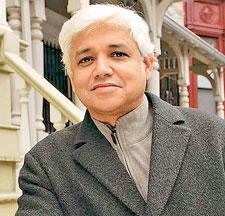Amitav Ghosh - Tangled Paths of Modernity
[Part – 2]
 To some it truly sings a siren song What Amitav Ghosh fictional and
non-fictional writings demonstrate to us is the way we can catch the
complex forces unleashed by globalisation in the culture-specific
interactive sites and moments that only gifted writers are capable of
depicting. He deftly avoids the twin dangers of a totalising
universalism and self-contained localism. To some it truly sings a siren song What Amitav Ghosh fictional and
non-fictional writings demonstrate to us is the way we can catch the
complex forces unleashed by globalisation in the culture-specific
interactive sites and moments that only gifted writers are capable of
depicting. He deftly avoids the twin dangers of a totalising
universalism and self-contained localism.
|

Amitav Ghosh |
Another strategy of his from which we can learn some valuable lessons
is the way he addresses the issue of human agency. The rise of such
newer cultural thought-lines as post-structualism and post-modernism has
resulted in the diminution, if not outright obliteration, of human
agency. Amitav Ghish is somewhat sympathetic to the tenets of
post-structuralism and post-modernism; at the same time he is deeply
aware of their limitations.
This is particularly evident in the way in which he handles the
concept of human agency. He recognises the importance the idea of social
construction of identity, the way in which language and culture shapes
human beings. At the same time he is also cognizant of the fact that
there is a space of agency for human beings. They are not totally at the
mercy of a kind of linguistic and social determinism. It is the way in
which he identifies these spaces of agency and dramatises their
significance that we as Sri Lankan writers and readers might find
particularly useful.
Modern thinkers such as Michel Foucault who have exercised such a
profound influence on the unfolding of contemporary thought have argued
that modernity has a way of bringing in novel regimes of domination and
disciplinarity. Consequently individual initiatives, freedoms and agency
are stifled giving way to a form of insidious governmentality.
However, Ghosh through is narratives underscores the fact that the
situation is more complex than most theorists would have us believe;
there are spaces of agency available and it is up to us – especially up
to novelists – to underscore this fact. Here, then, is another area that
Sri Lankan writers and readers might find productive.
Analysis
The way Amitav Ghosh fashions a cultural imaginary through his
created fictional worlds is a topic that repays close analysis. All
writers strain towards a cultural imaginary through their fictional
worlds. If we take Martin Wickremasinghe’s trilogy or Guanadasa
Amarasekera’s chain of novels we see this clearly. Ghosh underlines the
fact that meanings and significances associated with different cultures
cannot be understood as reflections of the economic base; the value
systems and linguistic mediations are equally important.
Through Ghosh’s novels – the incidents he depicts, the characters he
portrays, the problems he identities and possible solutions he advances
– a collective cultural imagination begins to take shape. It is this
collective cultural imagination that I refer to as the cultural
imaginary; it is volatile, many-sided, open-ended but very real and
unavoidable at the same time. Sri Lankan novelists and short story
writers – at least the more perceptive among them – are united in their
desire to fashion this cultural imaginary.
How do we make sense of contemporary flows of experience? What
valences do we attach to lived realities? In what ways do we recognise
and resolve the inevitable conflicts between individual and
collectivity? What are the tensions between citizen and nation? These
and kindred questions receive a valuable explanatory light through the
idea of the cultural imaginary. That is why influential novelists like
Amiatv Ghosh rate it so highly. And we can, again, learn a great deal
from the strategies adopted by Ghosh as a novelist as he seeks to
encircle this fact.
Creative writings
Most novelists, directly or obliquely, in their creative writings
address the issue of the nation-state. Amitav Ghosh is no exception. He
recognises the importance of the nation-state as a functioning unit in
the modern world. At the same time he realises the self-divisions,
fissures, fault lines that mark the nation state and undermine it. The
clash between these centripetal and centrifugal forces within the
nation-state is one that Ghosh chooses to focus on.
It is also interesting to observe that Ghosh is of the conviction
that nationalism and communalism far from being sworn enemies can
operate in the same side of the fence. He reconfigures sensitively how
blood and topography, time and memory, flow into each other within the
perimeter of the nation-state. As opposed to these conflicts of
nationalism and communalism, the author proposes a kind of syncretic
unity which some critics have dismissed as overly simplistic. A passage
such as the following bears witness to this ambition of Ghosh.
‘The mosque became a great centre of pilgrimage, and every year
multitudes of people, Kashmiris, of every kind, Muslims, Hindus, Sikhs
and Buddhists would flock to Hazratbal on those occasions when the relic
was displayed to the public. In the shadow lines the appeal of this
syncretism is hinted at; it is developed more fully in his non-fiction
work in an antique land.
As we grapple with our own issues of ethnicity, communalism,
nationalism and neo-imperialism in Sri Lanka the path of imaginative
apprehension that Amitav Ghosh has sought to clear is one that deserves
closer study.
So far I have been focusing on the themes, contents and visions of
Amitav Ghosh as an Indian-born novelist who writes in English. It is
equally important for us to shine a light on his use of language and
form.
- To be continued
|


